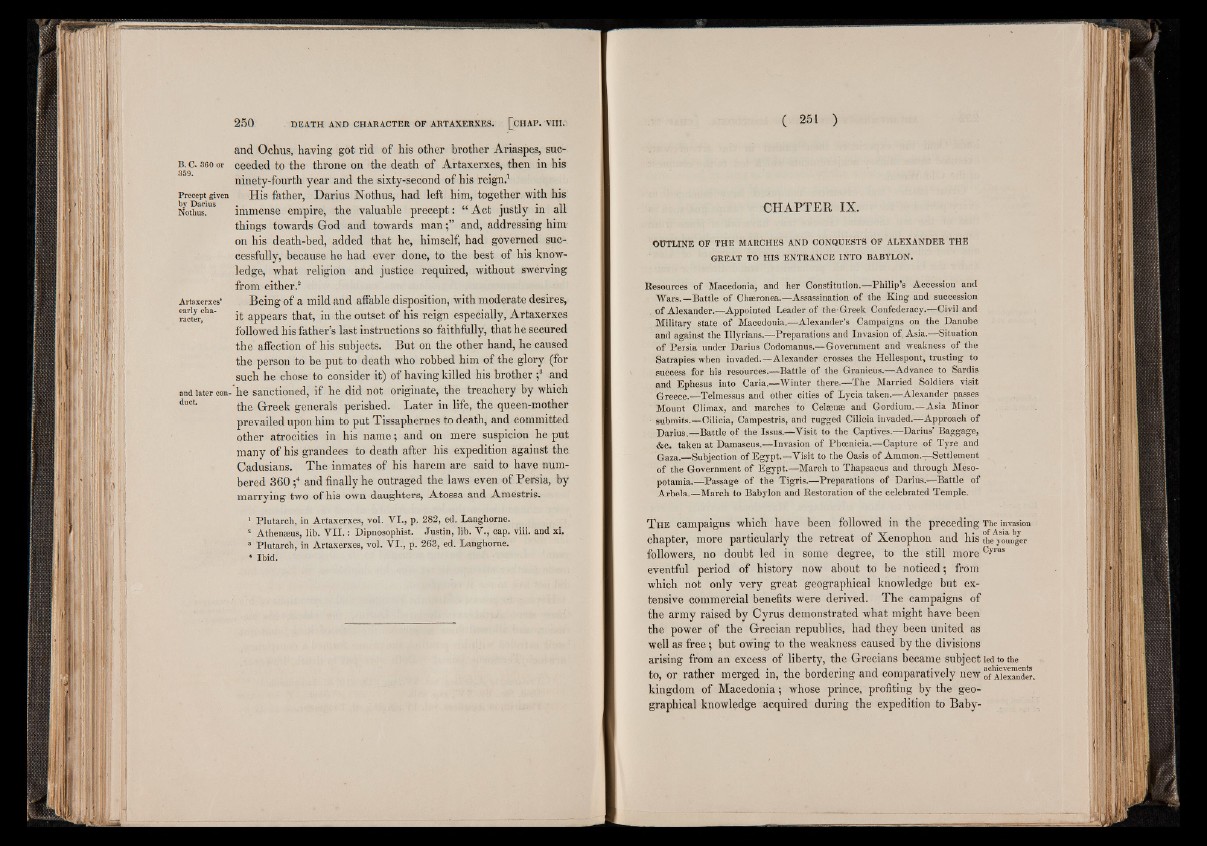
B. C. 360 or
359.
Precept given
by Darius
Notlius.
Artaxerxes*
early character,
and later conduct.
and Ochus, having got rid of his other brother Ariaspes, succeeded
to the throne on the death of Artaxerxes, then in his
ninety-fourth year and the sixty-second of his reign.'
His father, Darius Nothus, had left him, together with his
immense empire, the valuable precept: “ Act justly in all
things towards God and towards mana nd, addressing him
on his death-bed, added that he, himself, had governed successfully,
because he had ever done, to the best of his knowledge,
what religion and justice required, without swerving
from either.2
Being of a mild and affable disposition, with moderate desires,
it appears that, in the outset of his reign especially, Artaxerxes
followed his father’s last instructions so faithfully, that he secured
the affection of his subjects. But on the other hand, he caused
the person to be put to death who robbed him of the glory (for
such he chose to consider it) of having killed his brother ;3 and
'he sanctioned, if he did not originate, the treachery by which
the Greek generals perished. Later in life, the queen-mother
prevailed upon him to put Tissaphernes to death, and committed
other atrocities in his name; and on mere suspicion he put
many of his grandees to death after his expedition against the
Cadusians. The inmates of his harem are said to have numbered
360 ;4 and finally he outraged the laws even of Persia, by
marrying two of his own daughters, Atossa and Amestris.
1 Plutarch, in Artaxerxes, vol. V I., p. 282, ed. Langhorne.
5 Athenseus, lib. V I I . : Dipnosophist. Justin, lib. V., cap. viii. and xi,
3 Plutarch, in Artaxerxes, vol. V I., p. 263, ed. Langhorne.
4 Ibid.
CHAPTER IX.
OUTLINE OF THE MARCHES AND CONQUESTS OF ALEXANDER THE
GREAT TO HIS ENTRANCE INTO BABYLON.
Resources o f Macedonia, and her Constitution.—Philip’s Accession and
Wars.—Battle of Cheeronea.—Assassination of the King and succession
of Alexander.—Appointed Leader of the-Greek Confederacy.—Civil and
Military state of Macedonia.—Alexander’s Campaigns on the Danube
and against the Illyrians.—Preparations and Invasion of, Asia.—Situation
of Persia under Darius Codomanus.—Government and weakness of the
Satrapies when invaded.—Alexander crosses the Hellespont, trusting to
success for his resources.—Battle of the Granicus.—Advance to Sardis
and Ephesus into Caria.—Winter there.—The Married Soldiers visit
Greece.—Telmessns and other cities of Lycia taken.—Alexander passes
Mount Climax, and marches to Celsense and Gordium.—Asia Minor
submits.—Cilicia, Campestris, and rugged Cilicia invaded.—Approach o f
Darius.—Battle of the Issus.—Visit to the Captives.—Darius’ Baggage,
&c. taken at DamascusH-Invasion of Phoenicia.—Capture of Tyre and
Gaza.—Subjection of Egypt.—Visit to the Oasis of Ammon.—Settlement
of the Government of Egypt.—March to Thapsacus and through Mesopotamia.—
Passage of the Tigris..—Preparations of Darius.—Battle of
Arbela.—March to Babylon and Restoration of the celebrated Temple.
The campaigns which have been followed in the preceding The invasion
chapter, more particularly the retreat of Xenophon and his the younger
followers, no doubt led in some degree, to the still moreCyrus
eventful period of history now about to be noticed; from
which not only very great geographical knowledge but extensive
commercial benefits were derived. The campaigns of
the army raised by Cyrus demonstrated what might have been
the power of the Grecian republics, had they been united as
well as free; but owing to the weakness caused by the divisions
arising from an excess of liberty, the Grecians became subject led to the
.v i • ,i i j j ,• i achievements to, or rather merged in, the bordering and comparatively new 0f Alexander,
kingdom of Macedonia; whose prince, profiting by the geographical
knowledge acquired during the expedition to Baby